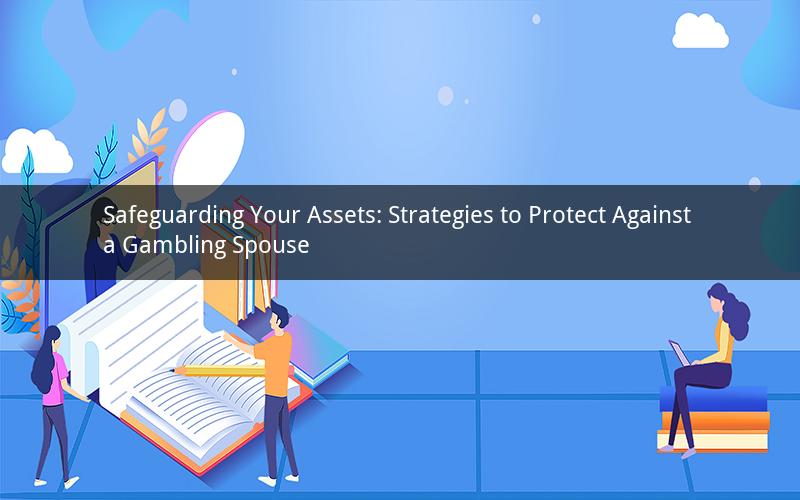
Introduction:
Gambling addiction can be a devastating issue that affects not only the gambler but also their loved ones, particularly their spouse. If you suspect or know that your partner has a gambling problem, it is crucial to take immediate action to protect your assets. This article will explore various strategies and steps you can take to safeguard your finances from the potential damage caused by a gambling spouse.
1. Understand the Problem:
The first step in protecting your assets is to acknowledge the severity of your spouse's gambling addiction. Educate yourself on the signs and symptoms of gambling addiction to ensure you can identify the problem accurately. Some common signs include secretive behavior, financial stress, and changes in mood or personality.
2. Communicate Openly:
Open and honest communication is essential when dealing with a gambling spouse. Sit down with your partner and discuss your concerns. Be supportive, but also assertive in expressing your fears about the potential impact on your assets. It is crucial to maintain a non-confrontational approach to encourage your spouse to seek help.
3. Create a Budget:
Develop a budget that clearly outlines your monthly expenses and income. This will help you identify any discrepancies that may indicate gambling-related financial issues. Make sure to include separate accounts for your spouse's personal expenses, ensuring that their gambling habit does not affect your shared assets.
4. Secure Your Assets:
To protect your assets from a gambling spouse, consider the following steps:
a. Joint Accounts: Close any joint accounts that could be vulnerable to unauthorized withdrawals. If possible, open individual accounts for each person, allowing you to have more control over your finances.
b. Asset Lockdown: Place any significant assets, such as real estate or investments, in your name alone. This will prevent your spouse from accessing or selling them without your consent.
c. Freeze Credit Cards: If your spouse has a tendency to max out credit cards, consider freezing them to prevent further financial damage.
5. Seek Legal Advice:
Consult with a lawyer specializing in family law to understand your rights and options. They can help you draft a prenuptial or postnuptial agreement that outlines the division of assets in case of separation or divorce. This agreement should address the potential risks associated with your spouse's gambling addiction.
6. Encourage Professional Help:
Encourage your spouse to seek professional help for their gambling addiction. Therapists, counselors, and support groups can provide the necessary tools and resources to overcome this challenging issue. Support your spouse throughout their recovery journey.
7. Monitor Financial Activity:
Keep a close eye on your finances and your spouse's spending habits. Regularly review bank statements, credit card statements, and other financial documents to detect any suspicious activity. If you notice any signs of gambling-related financial issues, address them promptly.
8. Establish an Emergency Fund:
Create an emergency fund to cover unexpected expenses or to provide financial security in case of separation or divorce. This fund should be separate from your primary savings and should be easily accessible.
9. Foster Financial Independence:
Work towards achieving financial independence by building your own income sources. This will help reduce your reliance on your spouse's income and provide a safety net in case of separation or divorce.
10. Support and Encourage:
Lastly, remember to offer ongoing support and encouragement to your spouse throughout their recovery journey. Your unwavering support can make a significant difference in their ability to overcome their gambling addiction.
Questions and Answers:
Q1: Can I freeze my spouse's credit cards to prevent them from gambling?
A1: Yes, you can freeze your spouse's credit cards to prevent them from using them for gambling purposes. Contact your credit card issuer to request a freeze and ensure that any existing cards are canceled.
Q2: What should I do if my spouse refuses to seek help for their gambling addiction?
A2: If your spouse refuses to seek help, it is important to prioritize your own well-being. Continue to protect your assets and seek support from friends, family, or professionals who can offer guidance and advice.
Q3: Can a prenuptial or postnuptial agreement help protect my assets from a gambling spouse?
A3: Yes, a prenuptial or postnuptial agreement can help protect your assets from a gambling spouse. These agreements can outline the division of assets in case of separation or divorce, addressing the potential risks associated with your spouse's gambling addiction.
Q4: How can I encourage my spouse to seek professional help for their gambling addiction?
A4: Encourage your spouse to seek professional help by expressing your concerns, offering support, and highlighting the potential benefits of therapy or counseling. Share success stories of others who have overcome gambling addiction to inspire them.
Q5: Can a gambling spouse's addiction lead to divorce?
A5: Yes, a gambling spouse's addiction can lead to divorce. Financial stress, emotional turmoil, and the strain on the relationship can all contribute to the breakdown of a marriage. It is crucial to seek legal advice and consider all available options to protect your assets and well-being.